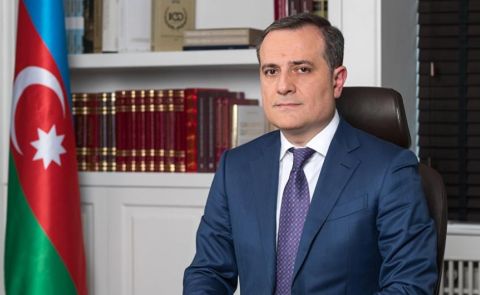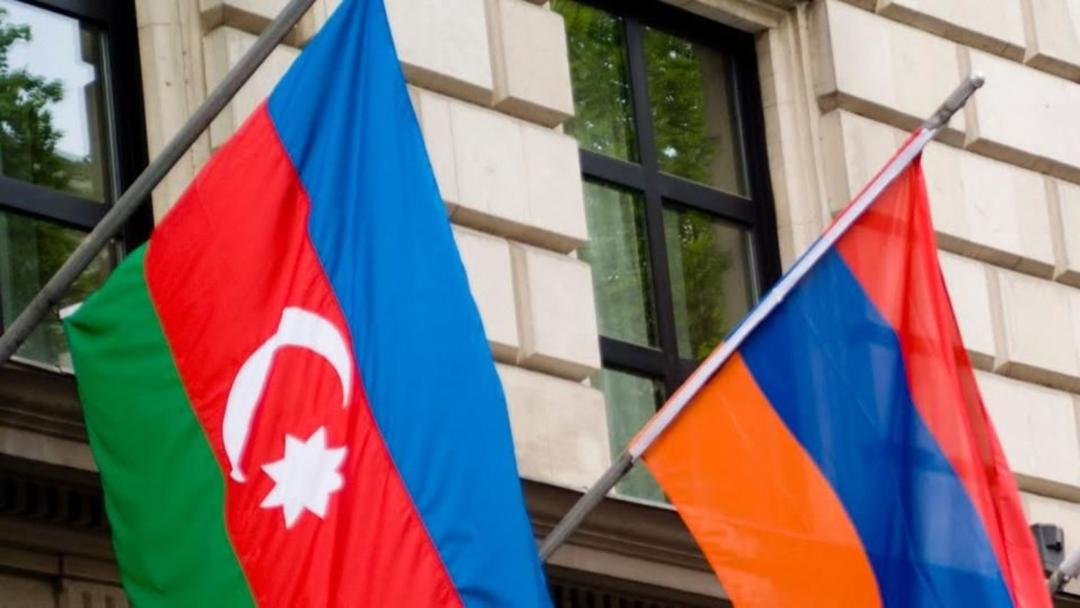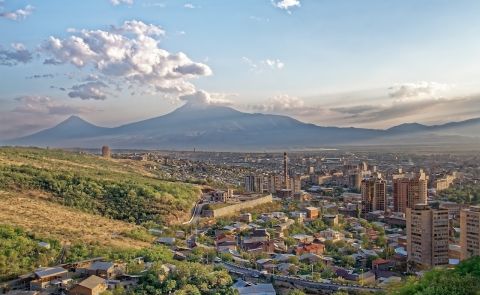
Twentieth day of the renewed Nagorno-Karabakh war

Military developments
On 16 October, the representative of Armenia’s Ministry of Defence (MOD) Artsrun Hovhannisyan reported that after intense shelling in the early morning, which lasted for about an hour, Azerbaijan launched a large-scale offensive in the northern direction of the front.
The Azerbaijani MOD reported that during the day on 15 October and on the night of 16 October, the operational situation in the Agdera-Aghdam and Fizuli-Hadrut areas of the front remained tense. In addition, the MOD emphasised that the territories of Goranboy, Terter, Fizuli, Aghdam, and Aghjabadi regions were subjected to shelling. The Azerbaijani MOD also reported that the Armenian armed forces launched a missile strike on the Ordubad district of Azerbaijan’s Nakhchivan Autonomous Republic, but no civilians or civilian facilities were affected. Armenia’s MOD refuted this information.
Pashinyan and Aliyev interviewed by Russian news agency
Armenia’s Prime Minister and Azerbaijan’s President Ilham Aliyev answered 6 questions from the Russian news agency “RIA Novosti” in regard to the ongoing conflict.
When asked how they assessed the military hostilities since the 27th September, Pashinyan highlighted that the scale of this war was unprecedented for the 21st century. In addition, Pashinyan said that all kinds of military equipment were in play, including tanks, drones, planes, helicopters, armoured vehicles, artillery and missile artillery.
Aliyev said that so far, 43 civilians have been killed, more than 200 wounded and about 2,000 houses were either completely destroyed or damaged during the hostilities. He added that Azerbaijan would announce how many Azerbaijani servicemen were killed after the conflict died down.
On the question of an alleged involvement of fighters from Syria and Libya on Azerbaijan’s side and if there are any foreign fighters from Armenia, Pashinyan answered that there is evidence for the former. This stance has been published on social media and he also said that these foreign fighters were not only involved in the strategic aspect of military operations, but also in operations on the ground. Pashinyan also emphasised that it was “obvious” that Turkey is the main sponsor of this war. When speaking on the presence of foreign fighters on the Armenian side, Pashinyan said that there might be some Armenians who came from the diaspora to support their compatriots, but they cannot be considered mercenaries.
Aliyev stressed that there was no need for foreign military participation on the Azerbaijani side, as the Azerbaijani Army has more than 100,000 men and that there was no evidence to show the involvement of foreign forces. He also emphasised that Azerbaijan has consistently fought against international terrorism, and that the country would never allow any terrorist organisations to build nests on their territory.
Both leaders were asked how they interpreted the Moscow agreement from 10 October and what are the basic principles of the settlement. Pashinyan said that the right to self-determination of peoples, no use of force or threats to use force, and territorial integrity were the key principles. He also added that during the negotiation process, it turned out that different parties interpreted these principles in different ways.
Aliyev emphasised that the basic principle was the liberation of the occupied Azerbaijani territories. He then elaborated on two phases of the settlement, the first one being the liberation of the five districts in the south eastern part of Nagorno-Karabakh, while the second stage would be the liberation of the territories between Nagorno-Karabakh and Armenia: the Lachin and Kelbajar regions. Aliyev also stated that all supply lines need to be opened, as well as returning refugees and internally displaced persons to their places of origin before starting the negotiations on the final status of Nagorno-Karabakh.
On the question of what compromises would the two heads of state be willing to make, Pashinyan stressed that the “red line” for Armenia is the right to self-determination of Nagorno-Karabakh and that the Armenian side could not give this up. He added that Armenia would be ready to make compromises proportional to those that Azerbaijan is ready to make.
Aliyev’s standpoint was that under no circumstances can the territorial integrity of Azerbaijan be violated, and that Azerbaijan would not consent to the independence of Nagorno-Karabakh. He proposed that in the future, the Armenian and Azerbaijani communities should live and coexist peacefully on the territory of Nagorno-Karabakh.
On the question of how the two statesmen would like this war to be written about in the history books, Pashinyan answered that he would like this conflict finally to be resolved based on a compromise that would be acceptable for Armenia, Azerbaijan and the Nagorno-Karabakh Armenian’s.
Aliyev stressed that there are Armenian occupation forces in the internationally recognised territories of Azerbaijan and that nothing can justify this: neither from the point of view of international law, nor from the point of view of morality. He also emphasised that 90% of the servicemen of the de facto Defence army of Nagorno-Karabakh are Armenian citizens who were drafted for military service by the Armenian military registration and enlistment offices.
Other notable political developments
Armenia's Ministry of Economy unveiled a bill designed to ban the import of goods of Turkish origin into the country. “The economic restriction on the import of goods of Turkish origin, nevertheless, first of all includes a security component, since the obvious fact is that Turkey openly supports Azerbaijan in the military and terrorist actions unleashed against Nagorno-Karabakh,” the ministry said.
The ministry added that the banned goods can be easily replaced with imports from other countries or locally made ones. According to the statistics, in the first half of this year, Armenian exports to Turkey dropped by 72.3% year-on-year to $374,000, while Armenia's imports from Turkey dropped by 14.5% to about $99 million.
The Armenian Ministry of Defence urged the international community, in particular the OSCE Minsk Group Co-Chairs, to have their statements and appeals directly address the side of the conflict that avoid establishing a ceasefire and the necessary verification mechanisms for the maintenance of the ceasefire regime.
The US Secretary of State Michael Pompeo, in an interview with Erick Erickson of The Erick Erickson Show on WSB Atlanta stated that he hopes that Armenians will be able to defend against what the Azerbaijanis are doing. He said that what’s taking place in Azerbaijan and Armenia today is dangerous. “We now have the Turks, who have stepped in and provided resources to Azerbaijan, increasing the risk, increasing the firepower that’s taking place in this historic fight over this place called Nagorno-Karabakh, a small territory with about 150,000 people,” he said.
He recalled that it’s a longstanding conflict and said that the resolution of that conflict ought to be done through negotiation and peaceful discussions, not through armed conflict, and certainly not with third party countries coming in to lend their firepower to what is already a powder keg of a situation. “We – we’re hopeful that the Armenians will be able to defend against what the Azerbaijanis are doing, and that they will all, before that takes place, get the ceasefire right, and then sit down at the table and try and sort through this – that is – what is a truly historic and complicated problem set,” Pompeo stated in his interview.
Pompeo’s statement sparked negative reactions from the Azerbaijani Ministry of Foreign Affairs. “The Azerbaijani side believes that remarks by the US Secretary of State are not in line with the numerous official statements made by the US Government regarding the conflict on previous occasions. These remarks also do not correspond to the status of the US as one of the Co-Chairs of the OSCE Minsk Group,” read the short statement of the Azerbaijani MFA.
See Also


Nordic-Baltic Delegation Meets Armenian Leaders to Discuss Regional Cooperation and Peace

Azerbaijan Strengthens Energy Partnerships with Multiple Countries

BP Strengthens Presence in Azerbaijan’s Offshore Energy Sector

Netanyahu’s Letter to Aliyev: Mutual Trust, Solidarity Following Hamas Attacks, Facilitating Dialogue Between Israel and Türkiye

